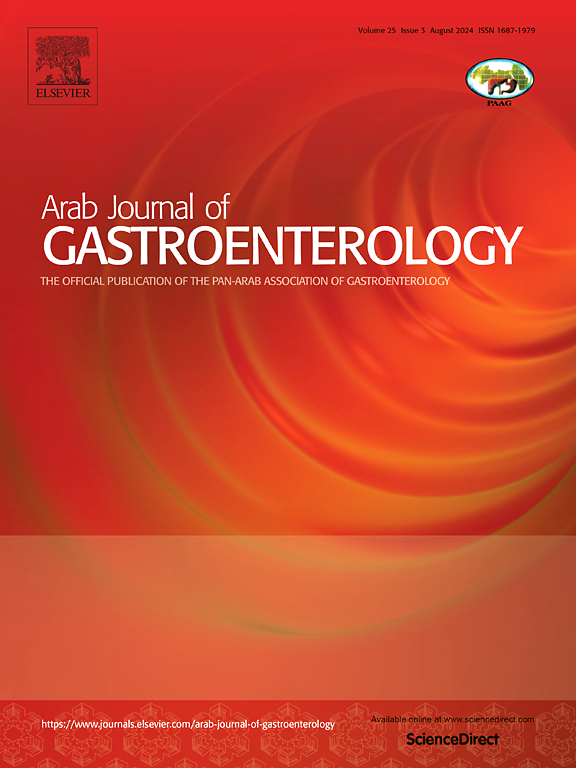靶向AFP-GPC3的嵌合抗原受体- t细胞介导肝细胞癌抗肿瘤疗效的增强。
IF 1.1
4区 医学
Q4 GASTROENTEROLOGY & HEPATOLOGY
引用次数: 0
摘要
背景与研究目的:CAR-T细胞技术作为一种新型的免疫疗法,在血液系统恶性肿瘤的治疗中取得了成功,并在部分实体肿瘤中显示出潜在的疗效。靶向一种抗原的疗法有一些弱点,双靶向CAR-T细胞可能是更好的选择。甲胎蛋白(AFP)和胰甘聚糖-3 (GPC3)在肝细胞癌(HCC)中均高表达,是重要的标志物。我们的研究旨在比较AFP和GPC3双靶向CAR-T细胞对体外肝癌细胞的细胞毒性作用,以及其对SCID异种移植模型的治疗效果。材料和方法:将携带AFP CAR、GPC3 CAR或AFP-GPC3 CAR构建体的pLVX慢病毒载体转染人T淋巴细胞。以对照T细胞、AFP CAR-T细胞、GPC3 CAR-T细胞和AFP-GPC3 CAR-T细胞为效应细胞,以HLE (AFP-GPC3-)、Sh-GPC3-Huh-7 (AFP+)、Sh-AFP-Huh-7 (AFP+GPC3+)细胞为靶细胞。共培养6小时后,采用LDH细胞毒性试验评估CAR-T细胞对靶HCC细胞的杀伤作用。给患有Huh-7细胞源性肿瘤的SCID小鼠注射CAR-T细胞,然后检测小鼠肿瘤组织的病理变化、CD3ζ的表达以及IL-2和IFN-γ的水平。结果:AFP和GPC3在Huh-7细胞中高表达。AFP-GPC3 CAR-T细胞对表达特异性靶向抗原分子(AFP和GPC3)的HCC细胞具有显著的细胞杀伤作用。此外,AFP-GPC3 CAR-T细胞比AFP- CAR-T和GPC3 CAR-T细胞更能促进Huh-7细胞分泌Th细胞因子。体内实验结果表明,AFP-GPC3 CAR-T细胞比AFP- CAR-T和GPC3 CAR-T细胞更能抑制Huh-7细胞(AFP+GPC3+)衍生肿瘤的生长。结论:AFP和GPC3双靶向CAR-T细胞在HCC中的抗肿瘤作用优于AFP或GPC3单靶向CAR-T细胞。本文章由计算机程序翻译,如有差异,请以英文原文为准。
Chimeric antigen receptor-T cells targeting AFP-GPC3 mediate increased antitumor efficacy in hepatocellular carcinoma
Background and study aims
As a novel immunotherapy, chimeric antigen receptor T (CAR-T) cell technology is successful in treating hematologic malignancies, and exhibits potential benefits in partial solid tumors. Therapies targeting one antigen have some weaknesses, and dual-targeted CAR-T cells may be a better option. Alpha-fetoprotein (AFP) and glypican-3 (GPC3) are both highly expressed in hepatocellular carcinoma (HCC) and serve as important markers. Our study aimed to compare the cytotoxicity effect of AFP and GPC3 dual-targeted CAR-T cells on HCC cells in vitro and its therapeutic effects on a SCID xenograft model with those of single-targeted CAR-T cells.
Materials and methods
pLVX lentivirus vectors loaded with AFP CAR, GPC3 CAR, or AFP-GPC3 CAR constructs were transfected into human T lymphocytes. Control T, AFP CAR-T, GPC3 CAR-T, and AFP-GPC3 CAR-T cells were used as effector cells, and HLE (AFP-GPC3-), Sh-GPC3-Huh-7 (AFP+), Sh-AFP-Huh-7 (GPC3+), and Huh-7 (AFP+GPC3+) cells were used as target cells. After their co-culture for 6 h, the LDH cytotoxicity assay was employed to estimate the cell-killing effects of CAR-T cells on the target HCC cells. SCID mice bearing Huh-7 cell-derived neoplasms were injected with CAR-T cells, after which the pathological changes, CD3ζ expression, and IL-2 and IFN-γ levels in mouse tumor tissues were determined.
Results
AFP and GPC3 were highly expressed in Huh-7 cells. AFP-GPC3 CAR-T cells exerted significant cell-killing effects on the HCC cells that expressed specific targeting antigen molecules (AFP and GPC3). Besides, AFP-GPC3 CAR-T cells better promoted Th cytokine secretion by Huh-7 cells than AFP CAR-T and GPC3 CAR-T cells. In vivo results suggested that AFP-GPC3 CAR-T cells better inhibited the growth of Huh-7 cell (AFP+GPC3+)-derived neoplasms than AFP CAR-T and GPC3 CAR-T cells.
Conclusion
AFP and GPC3 dual-targeted CAR-T cells showed better anti-tumor effects in HCC than AFP or GPC3 single-targeted CAR-T cells.
求助全文
通过发布文献求助,成功后即可免费获取论文全文。
去求助
来源期刊

Arab Journal of Gastroenterology
Medicine-Gastroenterology
CiteScore
2.70
自引率
0.00%
发文量
52
期刊介绍:
Arab Journal of Gastroenterology (AJG) publishes different studies related to the digestive system. It aims to be the foremost scientific peer reviewed journal encompassing diverse studies related to the digestive system and its disorders, and serving the Pan-Arab and wider community working on gastrointestinal disorders.
 求助内容:
求助内容: 应助结果提醒方式:
应助结果提醒方式:


